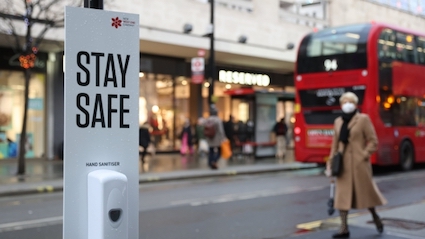England, Wales report record Covid cases
Britain is already among the worst hit countries in Europe with a virus death toll approaching 150,000.
(AFP) – England and Wales on Tuesday reported nearly 130,000 new coronavirus infections, a record daily tally as Omicron variant cases surge and the responses of the UK’s four nations continue to diverge.
Authorities in London and Cardiff announced 129,471 new cases, while the devolved government in Scotland provisionally recorded 9,360 infections and Northern Ireland released no new data due to the Christmas holidays.
Recent weeks have seen daily cases cross the 100,000 threshold across the UK for the first time during the pandemic, as Omicron has become the dominant strain of Covid-19.
Britain is already among the worst hit countries in Europe with a virus death toll approaching 150,000.
Following the recent rise in infections, the devolved governments in Scotland, Wales and Northern Ireland have each introduced renewed curbs on hospitality and bigger social gatherings.
But Prime Minister Boris Johnson, who has responsibility for health policy in England only, has so far decided against following suit with tougher restrictions there.
Under pressure from within his own ruling Conservatives not to enact new rules, he has focused on ramping up the country’s vaccine booster programme.
Nearly 33 million third doses had been administered by Tuesday, as officials race to meet a target of offering a booster jab to all adults by the end of the month.
Despite Edinburgh, Cardiff and Belfast all implementing their new curbs this week, Health Secretary Sajid Javid said Monday no further English rules will be rolled out before the New Year.
He vowed ministers would keep the latest data under constant review.
However, the lack of new measures goes against the advice of the government’s own scientific advisers, with some experts warning it could lead to the state-run health service being overwhelmed early in 2022.
Hospital admission rates are on the rise, particularly in London – which has been hardest hit by Omicron – where they are up 53% week-on-week.
But they remain below the levels seen at the peak of the pandemic in January.


